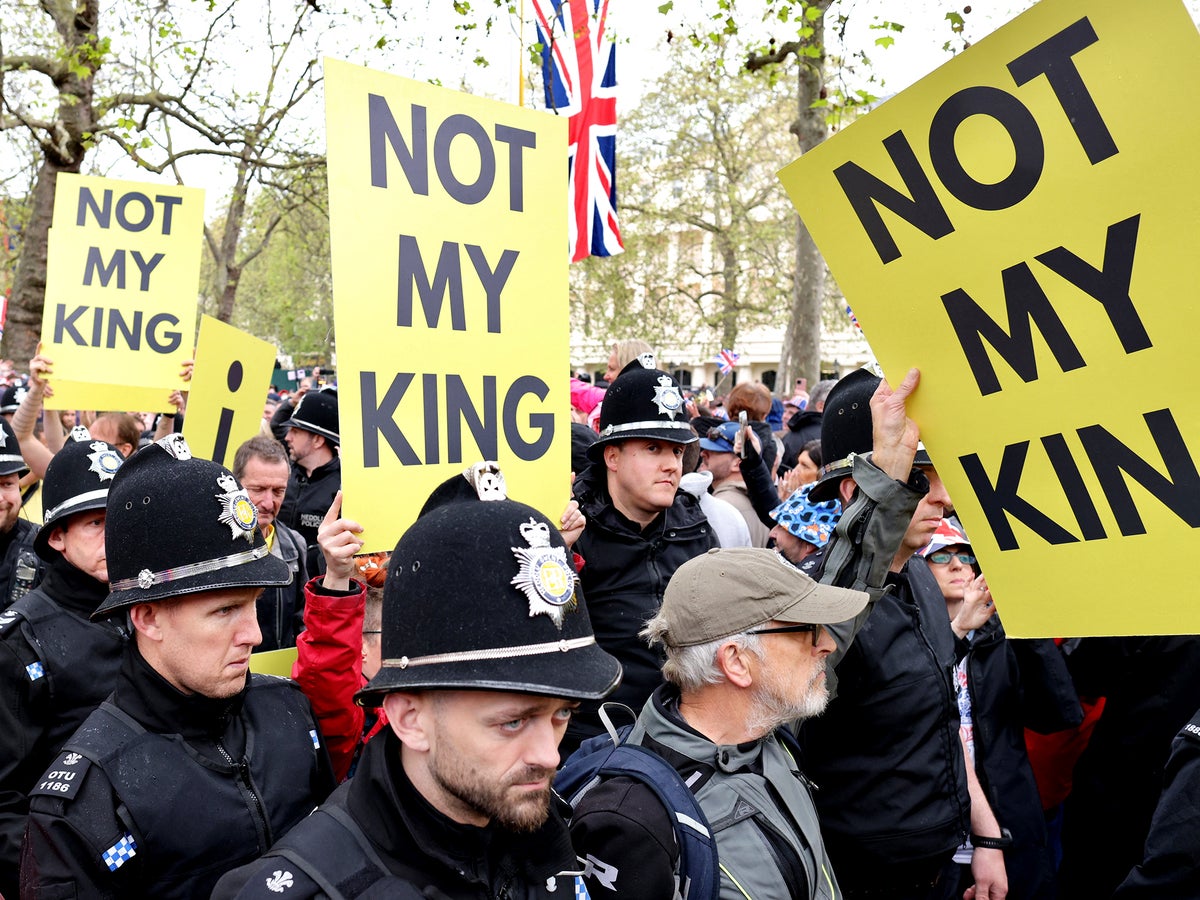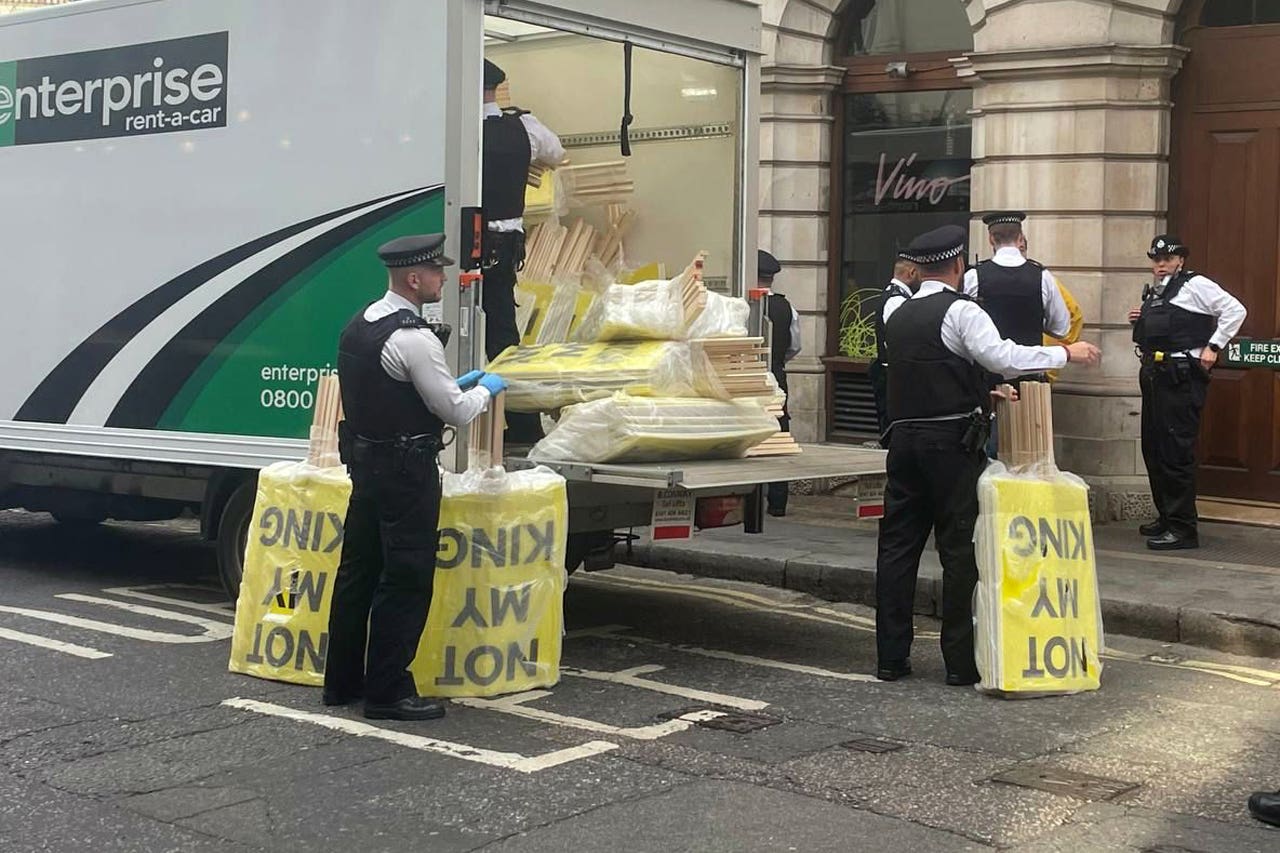
The Metropolitan Police has denied that the arrest of dozens of anti-monarchy protesters during the coronation was influenced by political pressure.
Human rights groups condemned in detention of republicans without charge, days after the enactment of new protest powers backed by the home secretary.
MPs grilling senior officers over the operation were interrupted by a protest by Just Stop Oil on Wednesday, causing a live video feed showing the Home Affairs Committee questioning senior officers to be temporarily cut.
A man could be heard saying “we are here to today because our democracy…”, before MPs interjected and called for security to intervene and screens went blank.
Earlier in the session, Metropolitan Police temporary assistant commissioner Matt Twist denied that the operation around King Charles III’s coronation was affected by political pressure.
“We rigorously guard our operational independence and police the laws as they are set without fear or favour,” he said.
“From my point of view I felt no pressure politically … the stakes were enormously high so I absolutely felt pressure to deliver a safe and secure operation, but that wasn’t political pressure.”
The session heard that 52 protest-related arrests were made as part of the coronation operation, codenamed Golden Orb, on suspicion of offences including “conspiracy to cause a public nuisance” and going equipped to cause criminal damage.
They included “proactive” arrests of protesters from the groups Republic, Just Stop Oil and Animal Rebellion, as well as volunteers for Westminster City Council charity Night Star which hands out rape alarms.
London mayor Sadiq Khan demanded an explanation of the arrests, but in a public letter commissioner Sir Mark Rowley claimed there would be “much more serious questions to answer” if not for their actions.
The force has said it “regrets” the arrest of a royal fan who was mistaken for a member of Just Stop Oil and detained for 13 hours, after going to The Mall to celebrate the coronation.
Leading members of the anti-monarchy Republic campaign group were detained ahead of a rally organised in liaison with the Metropolitan Police, after officers found straps which protesters said were to secure placards in a van.
They were released after almost 16 hours in custody with no further action, and have said they are considering legal action.

It was the first time British police had used new powers banning the tactic of locking on, or carrying equipment used for that purpose, which came into force under the Public Order Act days earlier.
Mr Twist insisted the arrests were lawful and that “officers had to make a difficult judgement in the moment”. He confirmed that Republic members told police the straps were for securing placards, but said “in the threat environment officers believed they were items that could be used for locking on and that’s why the arrests were made”.
But Graham Smith, the chief executive of Republic, said he and his colleagues were “surrounded by large numbers of officers” before they had seen inside their van or knew the straps were there, adding: “It had the impression that they had turned up with the intention of detaining us.”
Mr Smith told the committee he had been liaising with the Metropolitan Police for months over the group’s “Not My King” rally in Trafalgar Square, adding: “We gave them every piece of information we possibly could … they made clear there were no concerns. We never had any intention of doing anything unlawful or disruptive.”
Mr Smith said he was arrested shortly after 6am, while moving equipment ahead of the protest, and that despite telling officers he had met with senior commanders they claimed it “did not matter”.
“I attempted to phone a liaison officer and [an officer] seized my wrist and seized my phone from my hand,” he added. “The straps were not physically capable of locking people on.”
Mr Twist said that large numbers of people were still able to protest against the monarchy during the coronation, but Mr Smith said the protest was “significantly diminished” after police seized megaphones and audio equipment, and that large numbers of demonstrators left the rally or decided not to attend after news of the arrests spread.
When questioned on why arresting officers appeared not to know of Republic’s prior liaison with the Met, Mr Twist said: “Had we been better able to connect the officers making the arrests with protest liaison teams that may have led to a different outcome.”
UK police under fire over coronation protester arrests
Show all 4Scotland Yard said it had received intelligence that there was going to be “a concerted attempt to disrupt the coronation procession”, causing official briefings to the home secretary and London mayor on the night before the coronation.
Mr Twist said officers on the ground had been “asked to be extremely vigilant and proactive”, and that the coronation was the “biggest protection operation we have ever run” given the high-profile dignitaries attending and huge crowds in London.
Intelligence that some protesters were intending to use rape alarms to disrupt the royal procession to Westminster Abbey, potentially by spooking horses, caused police to arrest charity volunteers on the night before the coronation.
Members of the Night Star charity, who help people in central London who are lost, drunk or vulnerable late at night, were arrested while on a routine patrol and had the church they are based in searched.
Volunteer Suzie Melvin said she showed officers emails from Westminster City Council, official leaflets and vests displaying the Metropolitan Police’s own logo, to no effect. She was not interviewed until 1pm on the day of the coronation, and kept in custody until 4pm.
Sacha Deshmukh, Amnesty International UK’s chief executive, said the coronation operation had been “heavy-handed” and showed the danger of new laws.
“The police overreaction was exactly what we’d been fearing - that the Met and other forces would routinely use extremely authoritarian new legislation to clamp down on any protest deemed ‘disruptive’ or ‘noisy’,” he added.
“The right to be able to peacefully protest is the lifeblood of any free and open society, yet we’ve almost sleep-walked into a period where the police can classify anything from t-shirts, banners, rape alarms or luggage straps a potential ‘threat’, swoop on people for being in possession of these items and then detain them for 16 hours at a time.”







